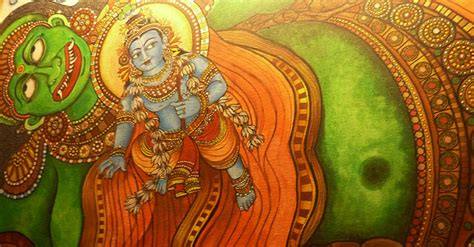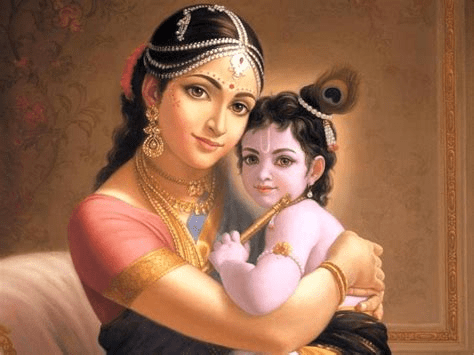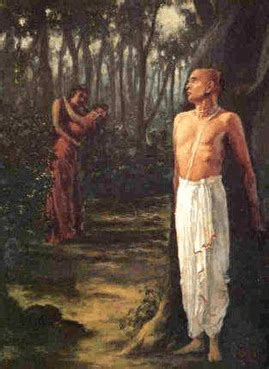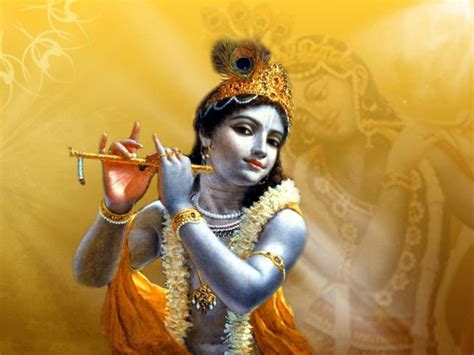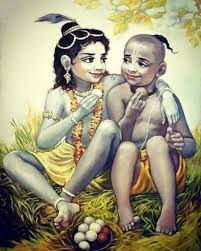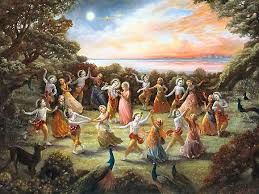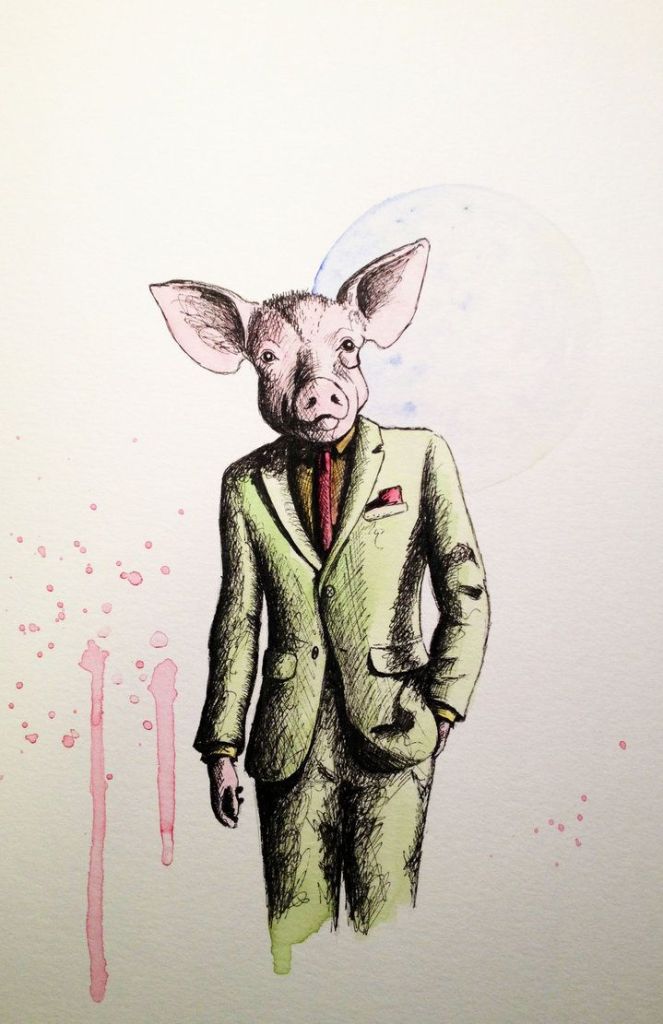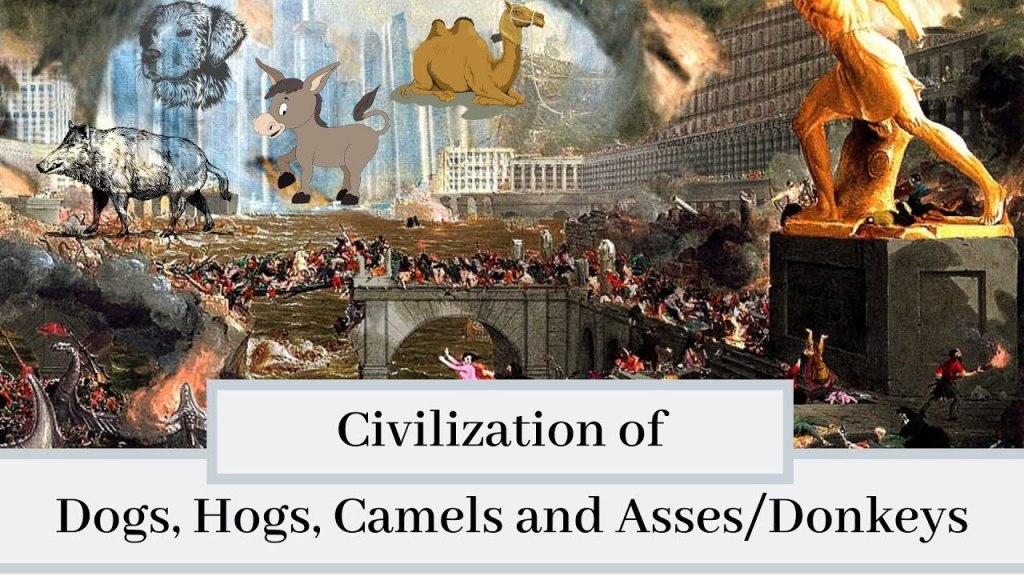Kaspars, 3 Dec 2015
Hare Krishna!
1. When in some difficulty, material, psychological or spiritual, can we pray to God to help us, or should we be patient and silent in difficulty.
2. Maybe early christians were in great difficulty of food, Jesus taught them to pray for bread, or see food as God’s mercy.
3. Why does everyone in Krishna consciousness criticize christians about praying for daily bread? Jesus himself taught that. I think we should not criticize other religions prayer, we should not criticize Jesus? That whole christian prayer is all good. It is saving people from all bad.
Kaspars
Premananda Das, 3 December 2015
1) All material difficulties are due to our lack of Krishna consciousness, no external suffering.
2 & 3) Krishna consciousness or Christ consciousness means to follow the order as it is without interpretations.
your servant
Premananda Das
Hare Krishna!
Please accept my humble obeisances!
Shridhar Das, 3 December 2015
All Glories to His Divine Grace Srila Prabhupada!
Your question has been answered here:
akāmaḥ sarva-kāmo vā
mokṣa-kāma udāra-dhīḥ
tīvreṇa bhakti-yogena
yajeta puruṣaḿ param
“A person who has broader intelligence, whether he be full of all material desire, without any material desire, or desiring liberation, must by all means worship the supreme whole, the Personality of Godhead.”
SB 2.3.10
So we must somehow or other develop the practice of always praying and remembering God. Should we be silent?
Krishna says in 4.11: As all surrender unto Me, I reward them accordingly.
So not advisable as a callous/impersonal approach.
Regarding patience, that’s very pleasing to Krishna and we must if we can but this quality manifests in advancing stages of devotional path automatically and needn’t be imitated artificially.
In BG 18.58 Krishna says:
mac-cittaḥ sarva-durgāṇi
mat-prasādāt tariṣyasi
atha cet tvam ahańkārān
na śroṣyasi vinańkṣyasi
“If you become conscious of Me, you will pass over all the obstacles of conditioned life by My grace. If, however, you do not work in such consciousness but act through false ego, not hearing Me, you will be lost.”
BG 18.58
In fact Krishna emphasizes in BG 18.65:
man-manā bhava mad-bhakto
mad-yājī māḿ namaskuru
mām evaiṣyasi satyaḿ te
pratijāne priyo ‘si me
“Always think of Me, become My devotee, worship Me and offer your homage unto Me. Thus you will come to Me without fail. I promise you this because you are My very dear friend.”
BG 18.65
So it is a very good practice to always pray and remember God. This is possible when we know who is God, how is God, what are His qualities, just as we cannot love a person in air blindly. We need to be aware of their qualities and features before devoting to any person.
Regarding question 2, I am curious about ‘maybe’. But in general, whenever God or His emissaries like Jesus, the son of Christ descend, their only mission is to take the fallen stuck up souls back to Godhead by developing their attachment for God. In fact, in our Krishna Consciousness we also pray sarira avidya jal prayers thanking God for not only giving us food but for sanctifying. The thanks is extended by offering food to the source of food, God, begging him to kindly take away the sinful reactions from that food and bless it with His love and devotion. And then this is distributed in mass for what is that love centered around personal liberation?
However, although the practice of praying to God for bread is glorious, if the end result is attachment to food instead of God, then such a process is not topmost. Hence, whenever the prayers aren’t fulfilled, people in general become atheist.
Not only food, Krishna in the 10th chapter of Bhagavad Gita tells us He is the taste of the water, He is light of sun, of senses He is mind and so many things.
His mercy is not limited to food, it’s beyond our imagination. In one of the lectures by His Divine Grace Srila Prabhupada that I was recently hearing, it was stated that it’s a fact that our existence at every moment is Lord’s kindness. If we’re existing, it means it is the personal will of the Lord at every moment. What can be the ultimate mercy than God Himself descending to show us the guiding light? How can one not feel loved and purchased when we see Lord has given His Holy Names as the means to attain Him? Lord is Himself directly present in His Holy Names simply for our deliverance and is constantly sending His representatives time after time in this unbroken lineage. So our vision must stretch beyond food, water and material products.
Before answering the next question I wish to first clarify that the conception of Christianity, Islam, Hinduism, Buddhism, Jew,… as religions is incorrect. These are mere labels. Just as son of a lawyer cannot be rubber stamped as lawyer, a daughter of a doctor as a doctor, similarly no living entity can be labelled anything other than servant of God and ultimate religion being to love God by addressing Him as Krishna, Christ, Allah, Ram, Jehovah, wherever one’s devotion flows…
If someone criticizes a sect simply to satisfy one’s own senses or false ego, that’s displeasing to God. This is against austerities of speech clearly stated in the Bhagavad Gita. However, it’s very honest of you for having inquired the same sincerely.
What real religion is, in truth, is explained here:
“Completely rejecting all religious activities which are materially motivated, this Bhagavata Purana propounds the highest truth, which is understandable by those devotees who are fully pure in heart.”
SB 1.1.2
In a lecture on this same verse Srila Prabhupada says:
“So we should not approach God for economic satisfaction or for bread or for wood or for anything necessary for our life. God has arranged food for everyone, the aquatics, the birds, the beasts, the trees, the elephants or the other, four-legged animals, and why not for human being? Human being also, those who are uncivilized, still living in the forest, they have no arrangement for economic development, or they do not know, but they have got also food. Therefore sastra says,
tasyaiva hetoḥ prayateta kovido
na labhyate yad bhramatam upary adhaḥ
tal labhyate duḥkhavad anyataḥ sukhaṁ
kalena sarvatra gabhira-raṁhasa
[SB 1.5.18]
“One should try for developing God consciousness, not for anything else, because happiness and distress, they come automatically.” We haven’t got to try for it.
Happiness, everyone aspires for happiness. Nobody aspires for distress, but distress is forcibly come upon you. Similarly, the sastra says, “As distress comes without any desire, similarly, happiness also will come without any endeavor.” So long we are in the material world, the so-called happiness and distress will come and go, but our, the human life, the endeavor should be how to find out or revive our relationship with God. That is our main business.” [Unquote]
His Divine Grace A. C. Bhaktivedanta Swami Prabhupada
Therefore, the verse states, any faith or sect that has taught their follower how to love God, how to depend on God, how to remain satisfied, in bliss, undisturbed, amidst of all difficulties and miseries, simply by taking shelter of God is a successful religion, else it has failed. For the same reason our prayers, devotion, love, happiness, distress, everything should be aimed for the satisfaction of God, not personal satisfaction only.
Last point I wish to add is whatever the faith be but it must teach their followers to expand their vision to see God as an ever youthful all-perfect person, who is not aristocratic but all loving, indiscriminately. A true lover of God sees all the living entities as part and parcel of God including animals, insects, birds, trees, worms, aquatics and not without soul. Therefore, real love of God means loving all living entities. Most of them I meet while preaching conclude they love God but then they also love torturing their brothers and sisters by killing and eating them, which is very demoniac and sinful irrespective of one following Hinduism, Christianity, Islam, etc, as laws are universal just as 1+1=2 everywhere. Rather, in the ten commandments, the merciful Jesus, who is often cited as an ideal example in our movement, as Lord’s devotee, in whose foot steps we follow, has clarified “Thou shalt not kill”.
The Krishna Consciousness movement is not criticizing anyone rather my spiritual master has stated often, that the aim of the movement is to help everyone become a true lover of God. If one is a Christian, then a very ideal Christian, if Islam then a true one, if a Sanatana Dharmi, then a genuine Sanatana Dharmi or follower of Vedas.
Hence the movement is aimed around harmonizing all souls under the universal love of God.
What seemed as criticism to you against Christianity can be properly understood by Lord Jesus’s statement: Hate the sin, not the sinner.
So that pointing out was a merciful correction on an improper attitude of “Give me, give me, give me” whereas the mood of a devotee must be of “Giving giving giving”.
It is the duty of an acharya to point out the fallacies in a system established by other acharyas (Lord Jesus here) if they are being misinterpreted. The acharyas share a common consciousness, love of Godhead. They are not to be understood like us for they are free of hatred, envy, lust and other such mundane qualities. Their vision is centered around God, not nation, body, society, sect and so on.
Hope this satisfies you!
your servant
Sridhar Das
Shyamapriya devi dasi, 3 December 2015
Hare Krishna Kaspars Gulbis,
Please accept my greetings.
All glories to Srila Prabhupada.
Thankyou for your humble inquiries.
1. I would say why not?
“..Padaṁ padaṁ yad vipadāṁ..” In SB 10.14.58 this material world has been described as a place full of miseries and danger lurks at every step. So why not pray to God in all circumstances. Whether in happiness or distress we should always try to remember God and never forget Him.
2. Indeed the food offered to lord is also known as “Prasadam” in Sanskrit, which in literal sense means “mercy”. The food we offer to the Lord with love and devotion is transformed into Lord’s mercy and when we honour such transformed food stuff it has a great spiritual impact on our consciousness.
3. Also, a truly Krishna conscious person would never criticize anyone. Infact, in the conversations of Srila Prabhupada, we can see him addressing Jesus Christ as a vaisnava. A vaisnava is actually a para dukha dukhi, one who can not tolerate the suffering of others. Therefore, we have great respect for Jesus Christ who was preaching the message of the God, as per time, place and circumstances to relieve the living entities from the miseries of this material world.
Coming back to your question: praying for daily bread seems insignificant when we see that even a tiny ant gets its daily food without praying, What to speak of thousands of Elephants roaming on Earth eating tonnes and tonnes of food daily. Atleast, I never saw them praying for food. Who provides them all the required food? God. God is all merciful. Since we are in the human form of life with a developed consciousness compared to other forms of life, it only seems wise to capitalize on this unique opportunity and pray for something very rare, very precious, something which is inconceivably priceless- and that is Pure love of God.
I hope this helps. However, it would be enlightening to hear more from other readers as well.
Sincerely,
Shyamapriya devi dasi
Lalit, 3 December 2015
Hare Krishna!
I share my learning.
If we are in Krishna consciousness, we will not be in need of any prayer for “anything”.
With awakened consciousness,we can see things as they are and not as we perceive.
Pain or suffering is there till we are attached to it, the moment awakening happens we realize that everything is like a dream which shall pass.
We do not feel the pain of injury in dreams on waking up.
Many great saints suffered from ailments but their awakening helped them realize that suffering was for the physical body and not aatma (soul) or jeev.
Everything is temporary here, so enjoy as it comes, without any attachment.
Lalit
Sunil, 3 December 2015
Dear Kaspars,
—–
From introduction to Gita : Just what is the Bhagavad-gita? The purpose of Bhagavad-gita is to deliver mankind from the nescience of material existence. Every man is in difficulty in so many ways, as Arjuna also was in difficulty in having to fight the Battle of Kurukshetra. Arjuna surrendered unto Sri Krishna, and consequently this Bhagavad-gita was spoken.
From the book “Science of Self Realization” :
Whoever teaches how to know God and how to love Him—he is a spiritual master. Sometimes bogus rascals mislead people. “I am God,” they claim, and people who do not know what God is believe them. You must be a serious student to understand who God is and how to love Him. Otherwise, you will simply waste your time. So the difference between others and us is that we are the only movement that can actually teach one how to know God and how to love Him. We are presenting the science of how one can know Krishna, the Supreme Personality of Godhead, by practicing the teachings of theBhagavad-gita and the Srimad-Bhagavatam. They teach us that our only business is to love God. Our business is not to ask God for our necessities. God gives necessities to everyone—even to one who has no religion. For example, cats and dogs have no religion, yet Krishna supplies them with the necessities of life. So why should we bother Krishna for our daily bread? He is already supplying it. Real religion means to learn how to love Him.
The Srimad-Bhagavatam (1.2.6) says,
sa vai pumsam paro dharmo
yato bhaktir adhokshaje
ahaituky apratihata
yayatma suprasidati
First-class religion teaches one how to love God without any motive. If I serve God for some profit, that is business—not love. Real love of God is ahaituky apratihata: it cannot be checked by any material cause. It is unconditional. If one actually wants to love God, there is no impediment. One can love Him whether one is poor or rich, young or old, black or white.
Science of Self Realization by A. C. Bhaktivedanta Swami Prabhupada
From book “Teachings of Queen Kunti” :
Christians and Muslims are also Vaishnavas, devotees, because they offer prayers to the Lord. “O God,” they say, “give us our daily bread.” Those who offer this prayer may not know very much and may be at a lower stage, but this is a beginning, because they have approached God. Going to a church or mosque is also pious (catur-vidha bhajante mam janah sukritino ‘rjuna [Bg. 7.16]). Therefore those who begin in this way will one day become pure..
Teachings of Queen Kunti, by A. C. Bhaktivedanta Swami Prabhupada
Sincerely,
Bhakta Sunil
Jayendran C, 3 December 2015
Thank you devotees for the wonderful answers. Here is a wonderful shloka from the Bhagavatam that would be relevant.
akāmaḥ sarva-kāmo vā
mokṣa-kāma udāra-dhīḥ
tīvreṇa bhakti-yogena
yajeta puruṣaṁ param
Translation
A person who has broader intelligence, whether he be full of all material desire, without any material desire, or desiring liberation, must by all means worship the supreme whole, the Personality of Godhead
Purport
The Supreme Personality of Godhead Lord Śrī Kṛṣṇa is described in the Bhagavad-gītā as puruṣottama, or the Supreme Personality. It is He only who can award liberation to the impersonalists by absorbing such aspirants in the brahmajyoti, the bodily rays of the Lord. The brahmajyoti is not separate from the Lord, as the glowing sun ray is not independent of the sun disc. Therefore one who desires to merge into the supreme impersonal brahmajyoti must also worship the Lord by bhakti-yoga, as recommended here in the Śrīmad-Bhāgavatam. Bhakti-yoga is especially stressed here as the means of all perfection. In the previous chapters it has been stated that bhakti-yoga is the ultimate goal of both karma-yoga and jñāna-yoga, and in the same way in this chapter it is emphatically declared that bhakti-yoga is the ultimate goal of the different varieties of worship of the different demigods. Bhakti-yoga, thus being the supreme means of self-realization, is recommended here. Everyone must therefore seriously take up the methods of bhakti-yoga, even though one aspires for material enjoyment or liberation from material bondage.
Akāmaḥ is one who has no material desire. A living being, naturally being the part and parcel of the supreme whole puruṣaṁ pūrṇam, has as his natural function to serve the Supreme Being, just as the parts and parcels of the body, or the limbs of the body, are naturally meant to serve the complete body. Desireless means, therefore, not to be inert like the stone, but to be conscious of one’s actual position and thus desire satisfaction only from the Supreme Lord. Śrīla Jīva Gosvāmī has explained this desirelessness as bhajanīya-parama-puruṣa-sukha-mātra-sva-sukhatvam in his Sandarbha. This means that one should feel happy only by experiencing the happiness of the Supreme Lord. This intuition of the living being is sometimes manifested even during the conditioned stage of a living being in the material world, and such intuition is expressed in the manner of altruism, philanthropy, socialism, communism, etc., by the undeveloped minds of less intelligent persons. In the mundane field such an outlook of doing good to others in the form of society, community, family, country or humanity is a partial manifestation of the same original feeling in which a pure living entity feels happiness by the happiness of the Supreme Lord. Such superb feelings were exhibited by the damsels of Vrajabhūmi for the happiness of the Lord. The gopīs loved the Lord without any return, and this is the perfect exhibition of the akāmaḥ spirit. Kāma spirit, or the desire for one’s own satisfaction, is fully exhibited in the material world, whereas the spirit of akāmaḥ is fully exhibited in the spiritual world.
Thoughts of becoming one with the Lord, or being merged in the brahmajyoti, can also be exhibitions of kāma spirit if they are desires for one’s own satisfaction to be free from the material miseries. A pure devotee does not want liberation so that he may be relieved from the miseries of life. Even without so-called liberation, a pure devotee is aspirant for the satisfaction of the Lord. Influenced by the kāma spirit, Arjuna declined to fight in the Kurukṣetra battlefield because he wanted to save his relatives for his own satisfaction. But being a pure devotee, he agreed to fight on the instruction of the Lord because he came to his senses and realized that satisfaction of the Lord at the cost of his own satisfaction was his prime duty. Thus he became akāma. That is the perfect stage of a perfect living being.
Udāra-dhīḥ means one who has a broader outlook. People with desires for material enjoyment worship small demigods, and such intelligence is condemned in the Bhagavad-gītā (7.20) as hṛta-jñāna, the intelligence of one who has lost his senses. One cannot obtain any result from demigods without getting sanction from the Supreme Lord. Therefore a person with a broader outlook can see that the ultimate authority is the Lord, even for material benefits. Under the circumstances, one with a broader outlook, even with the desire for material enjoyment or for liberation, should take to the worship of the Lord directly. And everyone, whether an akāma or sakāma or mokṣa-kāma, should worship the Lord with great expedience. This implies that bhakti-yoga may be perfectly administered without any mixture of karma and jñāna. As the unmixed sun ray is very forceful and is therefore called tīvra, similarly unmixed bhakti-yoga of hearing, chanting, etc., may be performed by one and all regardless of inner motive.
https://vedabase.io/en/library/sb/2/3/10/
Bhagavatam had many instances where people depended on Krishna for their material miseries. King Gajendra depended on Krishna to save his life, Draupadi to protect her chastity, Uttara to save her womb from being destroyed, Dhruva to save his pride after being insulted. In this way, the Bhagavatam in my humble understanding states whoever comes to Krishna is never turned away and is purified even from the material desire they came for.
your humble servant,
Jayendran C
Kaspars Gulbis 3 December 2015
Hare Krishna Dear Devotees,
Please accept my humble obeisances. Please excuse my offenses.
All your kind answers are very nice! I understood that in real Krishna consciousness one doesn’t need to pray for ”anything”. That one has to expand his needs beyond bread and accept love for God that only our Krishna consciousness movement gives. Jesus is a Vaisnava and preached according to that place and circumstance. Also I understood that we can pray to Krishna anytime and must remember Him always. Is it all right?
Thank you!
Kaspars
Mahabhagavat Das, 3 December 2015
Dear Devotees,
Hare Krishna!
Thank you to all of you who participated in this wonderful Q&A. Indeed, this is the main purpose of this sda_students group, to ask questions, receive answers, help us all strengthen our faith, kill the doubts, and become gradually purified with this hearing and chanting about Krishna.
In a gathering, there needs to be a sincere question, and loving, knowledgeable authoritative answers from devotees who truly care.
Both are in abundance in this group of sincere spiritualists from all over the world.
Let the questions flow! Let the answers illuminate! Let us all hear and chant about Krishna and thus be fully engaged in body, intelligence, word and mind, let us enter into the spiritual dimension.
So what are we waiting for?
your servant,
Mahabhagavat Das
Vidaa Joon, 9 December 2015
Great answers, thank you. I agree and wish not to subtract anything from the answers but would like to add that for me another verse that comes to mind regarding the first question is BG 12.13-14, one of my favourites:
One who is not envious but who is a kind friend to all living entities, who does not think himself a proprietor, who is free from false ego and equal both in happiness and distress, who is always satisfied and engaged in devotional service with determination and whose mind and intelligence are in agreement with Me-he is very dear to Me.
I love it because, sure, we sometimes feel a need to pray for help with our problems, and who better than Krishna to be the recipient of our prayers, but if we keep in mind what the above verse says, even our problems will seem to vanish as we put things into perspective, and not only that -it’s exciting to hear how this attitude makes us dear to Krishna!
Also, I believe one should seek guidance from guru, sadhu, shastra when faced with difficulties, not that one has to suffer blindly.
your humble servant
Vidaa
Yamini Narang, 9 December 2015
Hari Hari!
Dear devotees,
Thank you very much for the wonderful Q&A discussion! So enlightening! Thank you so much! All glories to all of you! Jai Gurudev! Jai guru Mataji! Jaya Srila prabhupada!
your grateful and aspiring servant,
Bhaktin Yamini
Rathin Mandal, 9 December 2015
Hare Krishna,
Please accept my humble obeisances,
All glories to Srila Gurudeva and Srimati Gurumataji,
All glories to Srila Prabhupada.
Thank you for your questions. They are very good and important at the same time.
1. When in some difficulty, material, psychological or spiritual, can we pray to God to help us, or should we be patient and silent in difficulty.
When in a difficult situation we should remember Sri Krishna. Actually we should remember Him all the time. And yes, we should keep patience too. It should be understood that material and psychological problems are due to our own doing, our own past karma. One should understand that by present suffering one is burning his past karma. One should approach a senior devotee and discuss what Krishna Conscious activities he can do to lower his suffering and remember Sri Krishna more.
2. Maybe early christians were in great difficulty of food, Jesus taught them to pray for bread, or see food as God’s mercy.
3. Why does everyone in Krishna consciousness criticize christians about praying for daily bread? Jesus himself taught that. I think we should not criticize other religions prayer, we should not criticize Jesus? That whole christian prayer is all good. It is saving people from all bad.
I assure you, no one is criticizing Lord Jesus. Lord Jesus is a great Spiritual Master and taught us by his exemplary act as how to remember God at all times.
What may be confusing you is this, among the 10 commandments, one commandment says ‘Thou shall not kill’. Today christians are opening slaughterhouses to eat meat. Is that what following commandments mean?
Christians are praying for bread but are they offering the bread to Lord Jesus first. If Lord Jesus is providing them bread then the first share belongs to Lord Jesus. Just like the head of the family gets the first share. The better process would be to pray to Lord Jesus, thank Lord Jesus, offer Lord Jesus and then take what’s remaining.
your servant
Rathin
Kaspars Gulbis, 9 December 2015
Dear devotees,
All glories to all of you!
Every answer is wonderful and nice teaching. Thank you!
Serious Christians do offer prayers before eating, thanking the Lord for food and welcoming Jesus to join the meal with them. Although usually there is meat also having no idea of killing. They say animals have no soul, only humans have. There are also some serious people who strongly preach about vegetarianism and not killing.
Sincerely,
Kaspars
Tirtharaja Das, 11 December 2015
Hare Krsna
Please accept my humble obeisances
All glories to Srila Prabhupada
Jai Sri Sri guru gauranga
Thanks prabhu for this touchy aspect of the nine processes of devotional service.
To humbly respond to the first enquiry, yes devotees should approach the Lord for everything, thus by so doing we learn to completely and entirely depend on the Lord. In the advanced stage from the kanistha mentality we should aspire to not only imitate but to pray like queen Kunti. (Refer to Prayers of Queen Kunti).
In humble submission to 2 & 3, the Lord’s prayer as taught by Christ Jesus contains more than supplication for daily bread and for one to appreciate the depth of the prayer itself, it has to be taken in its entirety lest we seem to be like the blind men describing what is an elephant by the parts of an elephant they can touch.
For my own edification, I quote the same prayer and humbly entreaty all of us who can to meditate on the words of the prayer as vaishnavas and let it speak to our hearts.
Jesus Himself said (in Matthew 6: 8 – 13) … “Your Father already knows what you need before you ask Him. This then is how you should pray:
“Our Father in heaven;
May your Holy Name be honoured;
May your Kingdom come;
May your Will be done on earth as it is in Heaven.
Give us day by day the food we need.
Forgive us the wrongs we have done,
as we forgive the wrongs that others have done to us.
Do not bring us to hard testing,
but keep us safe from the Evil One.
Matthew 6: 8 -13
In verse 31 He further advises “So do not start worrying: ‘Where Will my food come from? or my drink? or my clothes? (These are the things the pagans (atheists, Asuras,) are always concerned about). Your Father in Heaven knows that you need all these things. Instead be concerned above everything else with the Kingdom of God and with what he requires of you…”
I ask forgiveness if I have offended anybody by quoting from a different scripture but just like Srila Prabhupada would quote Canakya Pandit saying that “a wise man should be able to collect gold from a rubbish damp” …..
Regards,
your lowly servant
Tirtharaja Dasa.
Mahabhagavat Das, 11 December 2015
Dear Tirtharaja Prabhu,
Please accept my humble obeisances.
All glories to Sri Guru and Gauranga!
All glories to Srila Prabhupada.
Thank you so very much Prabhu, for your insights!
Srila Prabhupada and all the Vaishnava Acharyas taught us to respect all the scriptures.
The only caution was to stick to those scriptures we study and understand thoroughly.
Srila Prabhupada`s statements, if not understood properly can cause misunderstandings.
Here are some quotes to help us appreciate context that Srila Prabhupada never criticized the Christians for this prayer, though it can be misunderstood that he criticized them, actually he was explaining the broader principle:
`There are different kinds of love or worship in the world. The beginning is, “O God, give us our daily bread.” This is the beginning. When we are, I mean to say, taught to love God, we are instructed that “You go to temple, go to church, and pray to God for your necessities, for your grievances.” That is the beginning. But that is not pure love. Pure love, perfection of pure love, can be found amongst the gopīs. That is the example.`
Srila Prabhupada lecture, Seattle Sep 30, 1968
`Yes. For the leaders. They are seeing this poor man is going to church or to temple for asking God, “God give us our daily bread.” They are taking the opportunity to spread atheism. They say, “Well, you have prayed for your bread in the temple or in the church. Have you got the bread?” They say, “No. Not yet.” “All right. Come to me. You ask me bread.” “Yes.” They are innocent, “Yes, Mr. such and such, give me bread,” and he gives bread. “Take this bread.” Then they are convinced, “Oh, God cannot give us bread. Our political leader can give bread.” This is, propaganda is going on.`
SB 1.1.2 lecture, London, Aug 18, 1971
`Those who are following the Vedic principles, they think like that. Not only they, others also, the so-called religious system, they also think like that. Just like the Christians. They go to church, “O God, give us our daily bread.” So this bread-supplying business is like that: “God simply supplies bread, and we eat and we enjoy.” Similarly, the Hindu system also there is: “O God, give me some money. I am very poor. I am suffering from disease. Please cure it.” And so everywhere you will find some motive in religiosity. So religion does not mean to solve the economic problem. `
Lecture SB 1.1.2, Caracas, Feb 23, 1975
`The Christian religion also, they say, “O father, give us our daily bread.” So God is accepted, actually He is the father. Must have. We must have original father. You cannot say there is no God. If you are existing, you are existing because of your father. Your father is existing because of his father, his father, his father. There must be somebody original father. That is logical conclusion, not that “I am born out of air” or “My father is born out of air, my grandfather is born…” No. There must be somebody—father. `
Lecture SB 1.2.1, New Vrindaban, Sep 1, 1972
Just like people generally go there like that, “O God, give us our daily bread.” Well, why you are asking God for daily bread? Daily bread is already given to everyone, even birds and bees. Your bread is also there. But people do not know that “My bread is already there. Why I shall bother God for daily bread? Let me learn how to love God.” God is giving us so many things without asking. God is giving us light, God is giving us water, God… Bhūmir āpo ‘nalo vāyuḥ khaṁ mano buddhiḥ… (BG 7.4). Everything He is giving you, without which cannot live.
Lecture SB 1.2.6 Delhi Nov 11, 1973
Dharma is not meant for that purpose.” People have become materialistic more and more because, just like in our country, “If you want economic development, then why you should go to temple?” The communist theory is also like that, that “If you want material happiness, why you are going to church and accepting, ‘O God, give us our daily bread’? The bread, you manufacture. You just work for it.” In one side, it is good. But this is also fact, that without God’s mercy, you cannot get even bread. Although bread you can manufacture, but the ingredients of the bread, the wheat, that is not in your hand.
Lecture SB 1.2.9-10, Delhi, Nov 14, 1973
In this case, the Bible is very much a hallowed scripture, your understanding of this scripture is clearly a most exemplary Vaishnava understanding, and Srila Prabhupada and Srila Gurudeva both quote from the Bible.
In fact, Srila Gurudeva loves King David`s prayer “Yea, though I walk through the valley of the shadow of death, I will fear no evil: for thou [art] with me; thy rod and thy staff…`
So thank you Tirtharaja Prabhu for adding your perspective. I pray that we may receive more of your association in this group.
your servant,
Mahabhagavat Das
Guru Vandana Devi Dasi, 19 December 2015
Hare Krishna!
Please accept my humble obeisances.
All glories to Srila Prabhupada.
I would like to add one more reference to this question:
When in some difficulty, material, psychological or spiritual, can we pray to God to help us, or should we be patient and silent in difficulty
Our real goal of life is to become a pure devotee of Krishna. Srila Prabhupada explains in his introduction to Nectar of Devotion that any desire except for service of the Lord is material desire. Then does it sound as though Uttama Bhakti is not for us and restricted to particular group or sect who do not have any desires at all? No, pure devotional service is not too exclusive . When Srila Rupa Goswami gave the definition for Uttama Bhakti, he did not write” anya abhilasa sunyam”, he gave it as ” anya abhilasita sunyam”. This means “void of any desires for sense gratification”.
We have integral desires for our survival, for self preservation but still we are not out of the realm of pure devotional service. When we face difficulty we pray, “Oh Krishna please help me” .It is a personal desire for existence still we are not excluded from pure devotional service.We have to be very careful to be pure in our desires, our motive should be pure without any personal agenda for sense gratification.
Out of six principles which Srila Rupa Goswami explains which assure complete success in pure devotional service, being patient (dhairyat) is one of them.
your servant
Guru Vandana devi dasi
Please subscribe to daily inspirational emails from His Grace Sriman Sankarshan Das Adhikari (Writings and lectures archived at www.ecstaticmedia.com ), written fresh every day from his travels around the world sharing the highest spiritual knowledge with everyone. Sign up now at www.joincourse.com
Benefit others now. Share this:
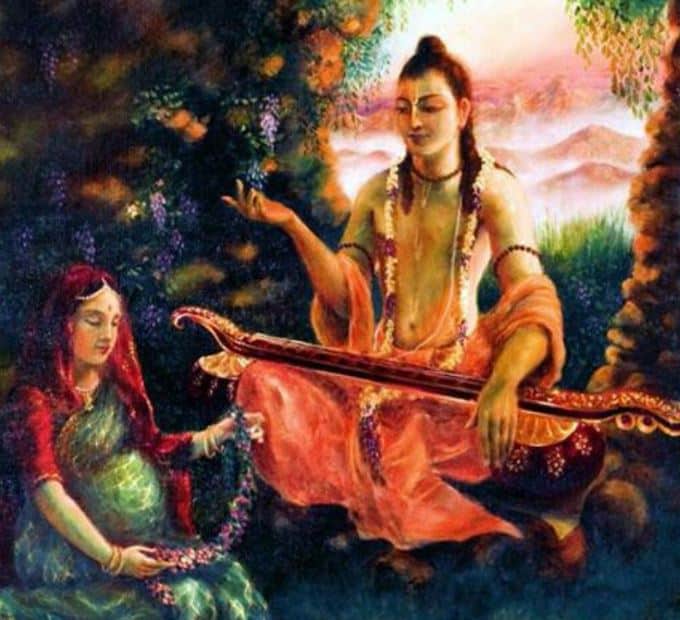



















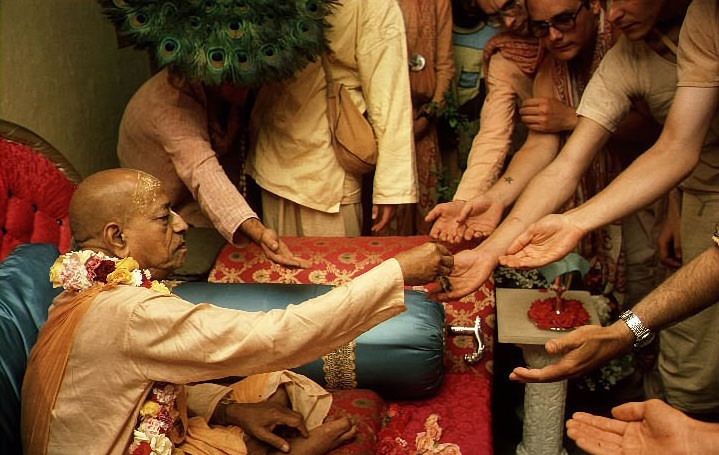










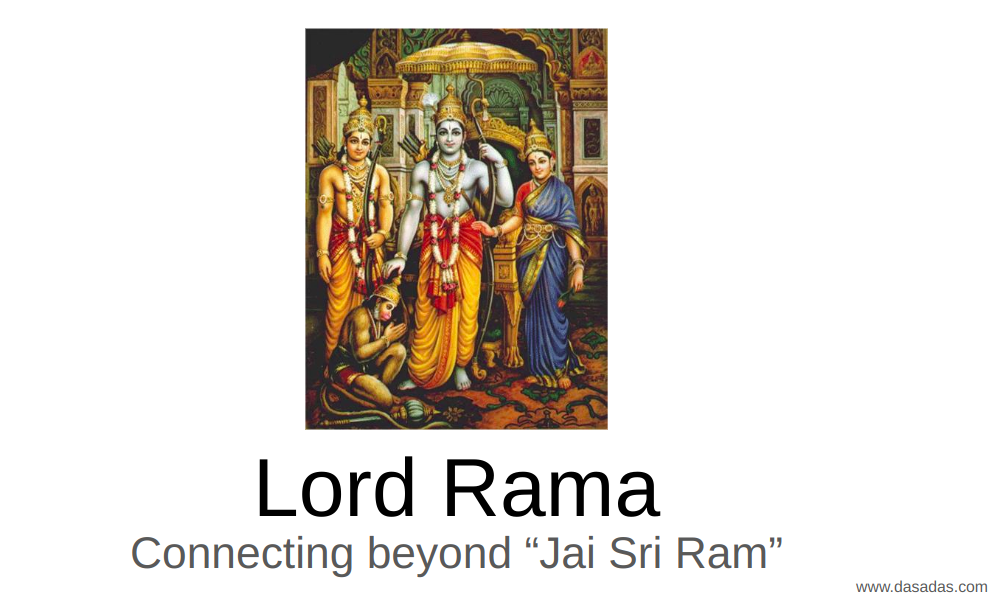
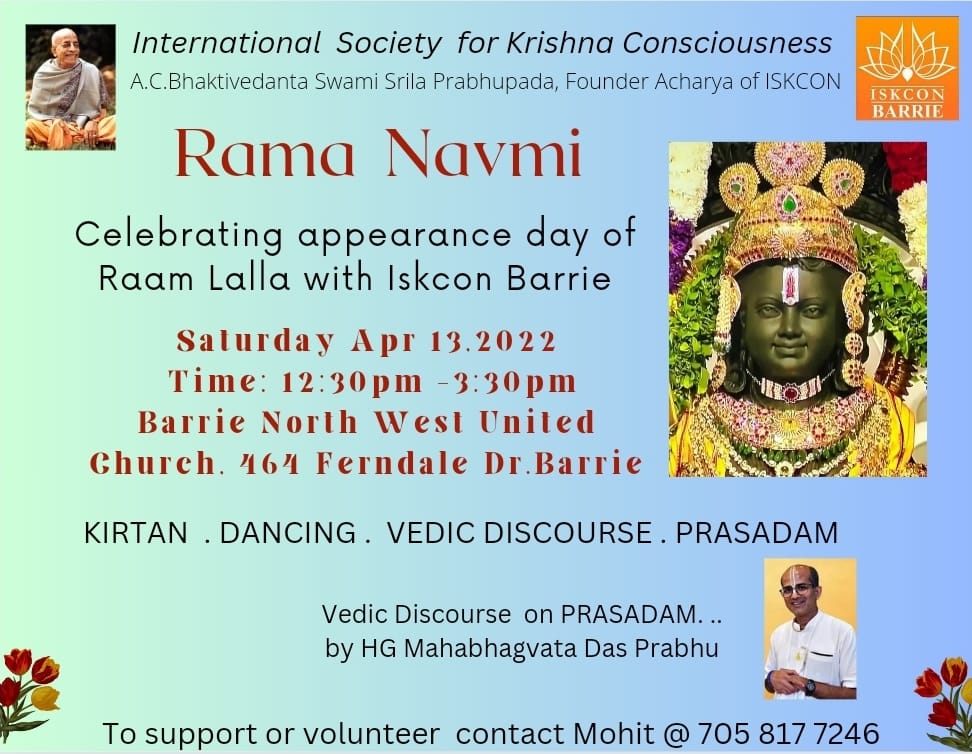




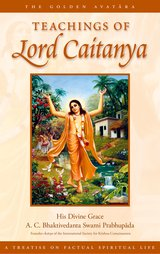









![The humble sages, by virtue of true knowledge, see with equal vision a learned and gentle brāhmaṇa, a cow, an elephant, a dog and a dog-eater [outcaste]. BG 5.18](https://dasadas.com/wp-content/uploads/2023/09/image-31.png?w=1024)








